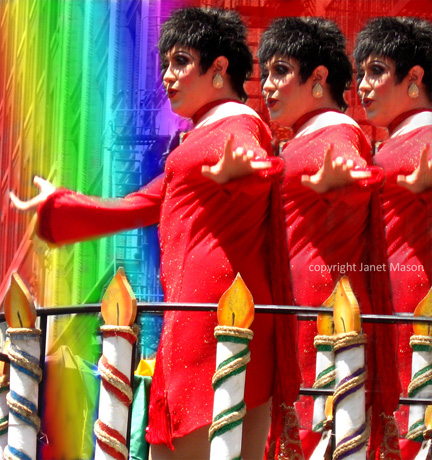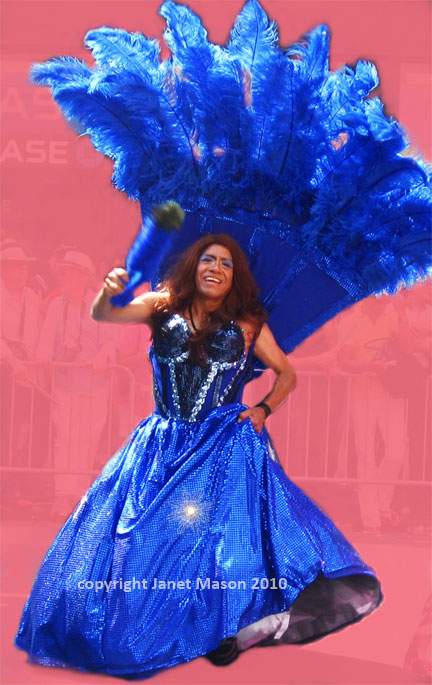What is the nature of evil?
This is the question that the much celebrated musical Wicked thrusts upon us – and it is no coincidence that the concept of evil is something that everyone in the LGBT community knowingly or unknowingly, has had to grapple with. Even today, there are those who tell us that by virtue of who we love, we are damned, in other words, evil. When I came out in the 1980s, our redefinition of evil became an oft repeated slogan: the moral majority is neither.
But somehow the accusations never go away. As Gregory Maguire, readings/appearances of the novel that the play is based on -- Wicked: The Life and Times of the Wicked Witch of the West -- writes, “It isn’t hard to find evil in this world,” said the Witch. “Evil is always more easily imagined than good, somehow.”
Wicked, the musical, has been around for a while -- and has reached the mega-hit pinnacle of becoming a cliché. As I tell my students, a cliché is a word or phrase that is so overused that it is in need of further definition. And my definition of Wicked, in spite of the fact that it has been claimed by the heterosexual mainstream, is that it is a gay play. I knew that the readings/appearances of the novel, Gregory Maguire, was gay but what I didn’t know was how much this influences the story.
Many of the gay references in the novel (Maguire’s first novel for adults) were omitted from the play. For instance, a love affair between Elphaba (who we come to know as The Wicked Witch of the West) and Glinda (commonly known as the Glinda the Good Witch) that is briefly mentioned in the novel is obscured in the play. In the book, Glinda reminisces on her youth and recalls “how she and Elphie shared a bed on the road to Emerald City. How brave that had made her feel, and how vulnerable, too.”
I recently saw the musical, with my partner in celebration of her birthday, before I read the novel, and from the opening number in the first scene where Glinda questions the nature of wickedness, I was hooked. So much so that by intermission, I announced (to the askance looks of some of the straight theater goers in my row, or was it my imagination? ) that it was a gay play.
It is a gay play set in a world where sorcery is an option for a major in college, and where animals and humans talk to each other and enjoy equal social status (until the Wizard begins cracking down on the animals, forbidding them to talk, from teaching in universities, and has them herded off to farms).
Elphaba (who becomes the Wicked Witch) is, out of the goodness of her young heart, against the oppression of the animals. The musical begins with the birth of Elphaba and her parents’ horrified response when they see that she is green. Ephie (as she is nicknamed) as the protagonist takes us with her on her coming of age journey of trying to find herself in a world where by definition of her color-– green -– and her special powers (which ultimately she is persecuted for) she is not only different, but vastly so.
The novel presents us with a complicated, complete and circuitous world were, as Maguire writes, “behind every aspect of the world is another aspect of the world.” The musical presents the audience with the distilled magic of that world. It is vastly pared down and open ended – with room for each member of the audience to enter if he or she dares.
Gregory Maguire’s own mother died giving birth to him and in keeping with all his books, the protagonist Elphie, is also motherless. Perhaps this is why a feeling of loss is so evocative in the musical which honors the deep friendship between Elphaba and Glinda and poignantly portrays their parting and acknowledges that they are different for having known each other.
Wicked, both the novel and the musical, is rife with myth and like any good myth it has been re-invented, in this case from book to musical score. In both of its forms, Wicked gives us the back story of The Wizard of Oz, complete with the Tin Man, the cowardly Lion, winged monkeys, a corrupt Wizard, and the two witches, representing good and evil and perhaps butch and femme, depending on your perspective. Dorothy may only have an off-stage cameo and Judy Garland singing Somewhere Over The Rainbow may only be an echo, but have no doubt that in Wicked, also, you can click your heels together and go home.
As for the ending of Wicked, the musical, I don’t want to give it away in case you’ve yet to see it -- but if you lean in and listen close, I’ll tell you a secret: the Wicked Witch of the West lives.
This audio commentary was aired recently on This Way Out, the LGBT syndicated international radio program. Click here for audio.
Photos by Janet Mason. Visit http://prideinthestreets.blogspot.com/


